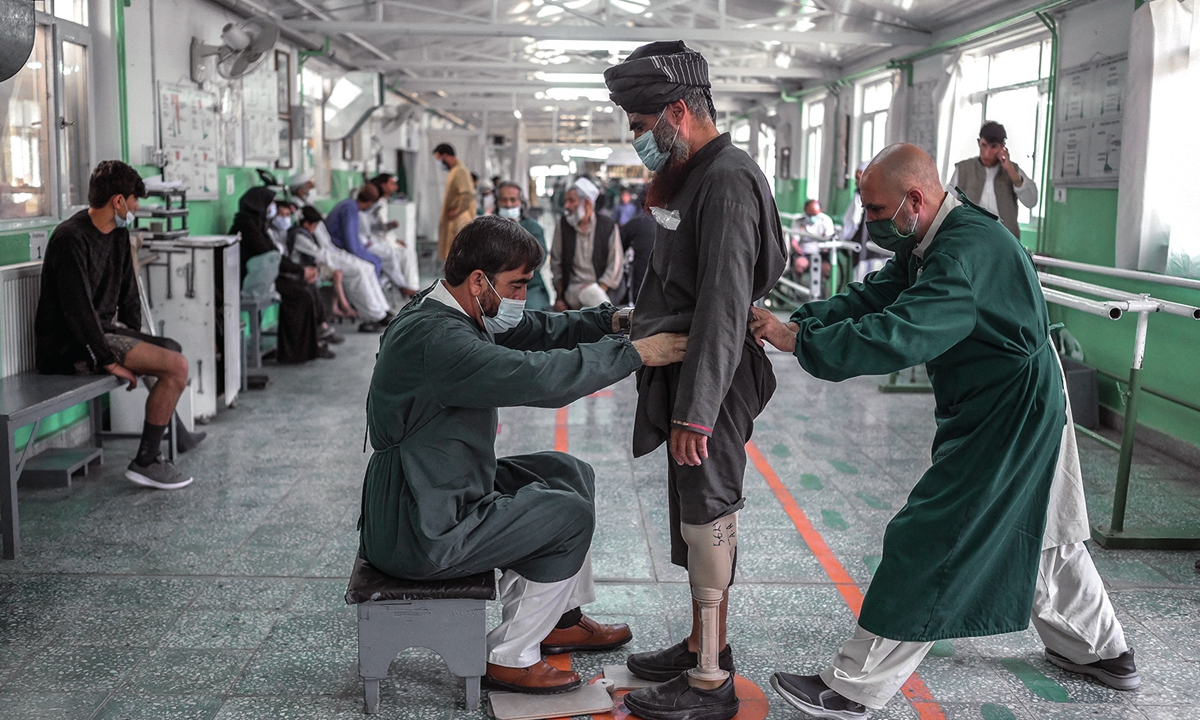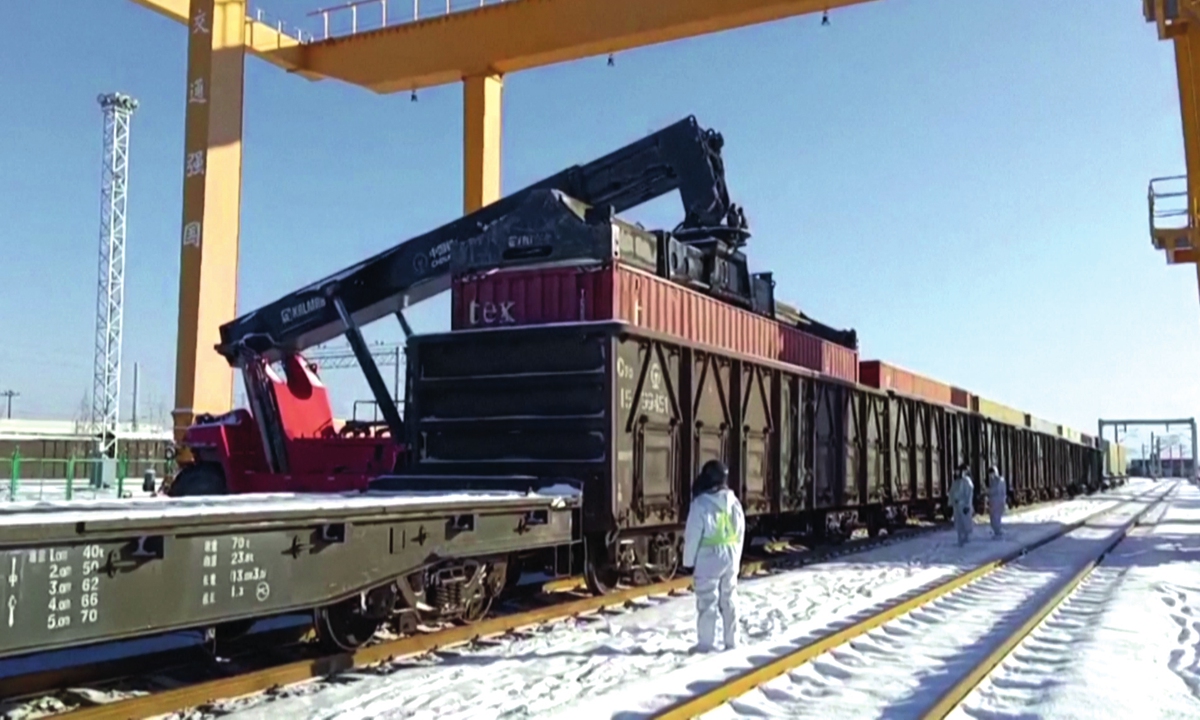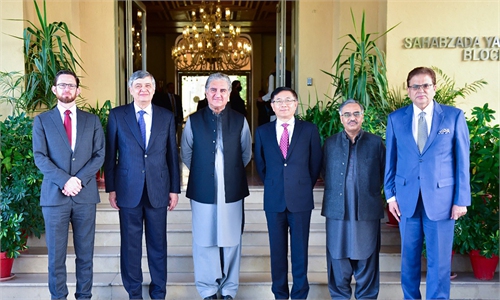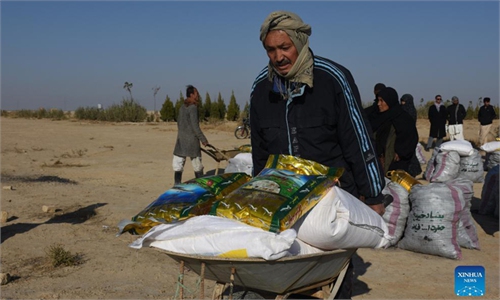ICRC official warns cash shortage may lead to humanitarian crisis in Afghanistan as US freezes $9.5 billion Afghan assets
While the international community pays close attention to the humanitarian crisis in Afghanistan, the US continues to seize nearly $9.5 billion in assets belonging to Afghan central bank with international organizations and experts globally issuing criticism that the move would worsen the situation in Afghanistan.
During an exclusive interview with the Global Times, Khoder El Tari, deputy head of delegation of the International Committee of the Red Cross (ICRC), said that cash availability in Afghanistan remains one of the greatest concerns for all sectors and it is crucial that the international community finds solutions, even if temporary, to help the Afghan people.
"Cash shortages within the country concretely mean that health facilities may not be able to pay for fuel to run their generators, ambulances can't run, there isn't food for patients, and salaries have not been paid to health care workers for the past three months," said Tari.
After taking power in August, the Afghan Taliban called on members of the US Congress to act to release frozen Afghan assets. In an open letter released in the middle of November, the Taliban Foreign Minister Amir Khan Muttaqi said the biggest challenge facing Afghanistan was financial insecurity and the "roots of this concern lead back to the freezing of assets" of the people by the US government.
In October, Deputy US Treasury Secretary Wally Adeyemo told a US Senate committee he saw no situation where the Taliban would be allowed to access the Afghan central bank reserves.
The US wants to use the frozen assets as bargaining chips in talks with the Afghan Taliban government, experts said, noting that while freezing the fortune of the Afghan people and seeing the people suffer from shortage of food and daily amenities, the US hypocritically said it cared about human rights situation in Afghanistan.

Worsening situation
Tari noted that as winter approaches in Afghanistan, temperatures can drop to minus seven in certain areas and freezing temperatures can expose the population, especially children, to numerous health risks. Lack of cash and fuel shortage constitute huge challenges for many families in keeping themselves warm during the harsh winter conditions.
"There is rising desperation among Afghans. Banks are either closed or struggling to fully function. Salaries are not being paid. Increasing cost of food, worsening shortages of critical medical supplies, and the nonpayment of government workers for the past three months all point to a looming catastrophe," the ICRC official said.
Typically, each paycheck supports about 15 persons. This nonpayment, along with an inability to access savings if they exist, sees Afghan markets full of people selling their belongings to raise cash to survive.
Tari noted that spikes in food prices have been reported across Afghanistan. Prices of basic commodities like flour, oil, and rice have sometimes more than doubled. For example, a 5-liter bottle of oil cost around $5 at the beginning of the year, while it now costs $10; the cost of a 20-kilogram-bag of rice has risen from $25 to $30; and flour from $20 to almost $27.
International organizations and scholars had warned against a possible shortage of food in Afghanistan previously. Staff at Save the Children, a UK-based humanitarian organization in Kabul, Faryab and Kunduz reported price hikes of up to 63 percent over the past month on goods such as flour, oil, beans, and gas. The organization warned that rising costs will leave many families unable to afford basic items.
Mei Xinyu, a research fellow at the Chinese Academy of International Trade and Economic Cooperation of China's Ministry of Commerce, said at an international seminar in September that global food prices have soared for two consecutive years, which was not only caused by natural disasters but also by man-made disasters. The US' relaxation of fiscal and monetary policies has led to rising commodity prices. In fiscal years 2019 and 2020, the per capita grain output in Afghanistan was only over 170 kg, which cannot guarantee the people's basic survival needs.
"Whether a food crisis will break out in Afghanistan is a big question. We can see that the US often boasts that it dominates the world order, but from what it has done, can it really promote the development of human rights in the world? It is a problem," said Mei.
Aside from soaring food price, Tari said that the ICRC is increasingly concerned that Afghanistan's health care infrastructure is on the brink of collapse.
"We received many reports that some health structures have stopped functioning due to a lack of fund."
To make things worse, Afghanistan has an overstretched health system, which has recently struggled to deal with the consequences of conflict as well as the ongoing COVID-19 pandemic.

But there has been a "substantial surge" in COVID-19 cases across the country, and less than 5 percent of the country is full vaccinated. Afghanistan has received nearly 4 million doses of the COVID-19 vaccine, enough to inoculate 2 million people, through the COVAX facility, which is clearly not enough in a country of nearly 40 million people, said Tari.
To solve the current problems in every sector in the country, Afghans not only need humanitarian assistance from the outside world but also to have assets unfrozen by the US to drive domestic economic mobility. However, the hands of the Afghan Taliban government are tied as they don't have enough funds to rebuild the country, Zhu Yongbiao, director of the Center for Afghanistan Studies in Lanzhou University, told the Global Times.
The ICRC is also working to help Afghanistan with the current cash shortage. Tari said that ICRC President Peter Maurer has had several conversations with key stakeholders after his trip to Afghanistan in September, including high level US interlocutors, the World Bank, and a Chinese special envoy to ensure the continuation of crucial support to the health infrastructure in Afghanistan that have been impacted.
"It's crucial that the international community finds solutions, even if temporary, to ensure continued funding essential to the protection and assistance of the Afghan people…The ICRC is also stepping up its protection activities as well as repairing and reconstruction of critical infrastructure (medical and water facilities, and electricity services), increasing its orthopedic and physical rehabilitation services, and livelihood interventions for the most vulnerable," said Tari.
Tari also noted that the ICRC has been working in the Taliban-ruled Islamic Emirate of Afghanistan (IEA) areas for years and has a positive working relationship with them.
"We engage with the IEA at both its top level and local leadership level. The change in government leadership has not changed our relationship with the IEA, and the current situation doesn't change the way we seek to operate," said Tari.
More help needed
While humanitarian organizations continue to do what they can to respond to the most pressing and urgent humanitarian needs, more sustainable solutions should be found, the ICRC official said, noting that the people of Afghanistan need a collective response aimed at providing support to the country, so they can rebuild the economy, ensure people's economic security, and stabilize the society.
"We urge the international community to continue investing in areas of high need, such as access to health care and other basic services, regardless of who is in charge," said Tari.
The situation in Afghanistan is urgent, but aid from Western countries and the US still remains just talk. Instead of directly helping people in Afghanistan, they prefer to put their money in neighboring countries to prevent refugees from going to the EU, Zhu said, noting that currently, a few countries, especially China, and UN organizations, are taking actions to help the Afghan people.
Several batches of humanitarian aids, including naan, cotton shoes, and blankets offered by China have arrived in Afghanistan. Moreover, China also started an "air corridor" for agricultural trade with Afghanistan to increase Afghan farmers' income and drive economic mobility in Afghanistan, promoting domestic economic development.
According to tweets from the Chinese Ambassador to Afghanistan Wang Yu, two batches of Afghan pine nuts have arrived to China. So far, there have been 10 flights carrying Afghan pine nuts to China and such flights will continue, with dry fruits as next priority.
Tari said that the 40 years of conflict have not only caused mass casualties, but have also damaged Afghanistan's economy. Nearly half of the 40 million-strong population is already in need of humanitarian protection and assistance. Some 47 percent of Afghans are facing serious food insecurity.
"Increasing cost of food, worsening shortages of critical medical supplies… all point to a looming catastrophe. Under such circumstances, any initiative that may help stabilize the local economy and support the livelihood of the Afghan population is welcomed," said Tari.
He noted that China is one of the important actors in Afghanistan as well as an important counterpart that the ICRC values. The ICRC has had broad engagement with China on the Afghan issue.
There is a hospital in Kandahar, named Mirwais Hospital built by China in the 1970s. It's known to the local people as the "Chinese hospital." The ICRC has been supporting this hospital since the 1990s. There would be potential for collaboration in the hospital or the broader health programs across the country.
Tari noted that the ICRC has held constructive and informative talks with counterparts at the governmental level, namely the Chinese foreign ministry. The ICRC President Peter Maurer met with Yue Xiaoyong, Special Envoy for Afghan Affairs of the Ministry of Foreign Affairs, in October.
"We have also had discussions with the Red Cross Society of China and we appreciate their support to the ICRC. Our delegation is grateful for the meeting we recently held with the Chinese ambassador to Afghanistan to discuss further support," said Tari.
During an exclusive interview with the Global Times, Khoder El Tari, deputy head of delegation of the International Committee of the Red Cross (ICRC), said that cash availability in Afghanistan remains one of the greatest concerns for all sectors and it is crucial that the international community finds solutions, even if temporary, to help the Afghan people.
"Cash shortages within the country concretely mean that health facilities may not be able to pay for fuel to run their generators, ambulances can't run, there isn't food for patients, and salaries have not been paid to health care workers for the past three months," said Tari.
After taking power in August, the Afghan Taliban called on members of the US Congress to act to release frozen Afghan assets. In an open letter released in the middle of November, the Taliban Foreign Minister Amir Khan Muttaqi said the biggest challenge facing Afghanistan was financial insecurity and the "roots of this concern lead back to the freezing of assets" of the people by the US government.
In October, Deputy US Treasury Secretary Wally Adeyemo told a US Senate committee he saw no situation where the Taliban would be allowed to access the Afghan central bank reserves.
The US wants to use the frozen assets as bargaining chips in talks with the Afghan Taliban government, experts said, noting that while freezing the fortune of the Afghan people and seeing the people suffer from shortage of food and daily amenities, the US hypocritically said it cared about human rights situation in Afghanistan.

Members of International Committee of Red Cross Rehabilitation center help a Taliban member, who claims to have lost his leg earlier during a US forces strike, in Kabul on October 11, 2021. Photo: AFP
Worsening situation
Tari noted that as winter approaches in Afghanistan, temperatures can drop to minus seven in certain areas and freezing temperatures can expose the population, especially children, to numerous health risks. Lack of cash and fuel shortage constitute huge challenges for many families in keeping themselves warm during the harsh winter conditions.
"There is rising desperation among Afghans. Banks are either closed or struggling to fully function. Salaries are not being paid. Increasing cost of food, worsening shortages of critical medical supplies, and the nonpayment of government workers for the past three months all point to a looming catastrophe," the ICRC official said.
Typically, each paycheck supports about 15 persons. This nonpayment, along with an inability to access savings if they exist, sees Afghan markets full of people selling their belongings to raise cash to survive.
Tari noted that spikes in food prices have been reported across Afghanistan. Prices of basic commodities like flour, oil, and rice have sometimes more than doubled. For example, a 5-liter bottle of oil cost around $5 at the beginning of the year, while it now costs $10; the cost of a 20-kilogram-bag of rice has risen from $25 to $30; and flour from $20 to almost $27.
International organizations and scholars had warned against a possible shortage of food in Afghanistan previously. Staff at Save the Children, a UK-based humanitarian organization in Kabul, Faryab and Kunduz reported price hikes of up to 63 percent over the past month on goods such as flour, oil, beans, and gas. The organization warned that rising costs will leave many families unable to afford basic items.
Mei Xinyu, a research fellow at the Chinese Academy of International Trade and Economic Cooperation of China's Ministry of Commerce, said at an international seminar in September that global food prices have soared for two consecutive years, which was not only caused by natural disasters but also by man-made disasters. The US' relaxation of fiscal and monetary policies has led to rising commodity prices. In fiscal years 2019 and 2020, the per capita grain output in Afghanistan was only over 170 kg, which cannot guarantee the people's basic survival needs.
"Whether a food crisis will break out in Afghanistan is a big question. We can see that the US often boasts that it dominates the world order, but from what it has done, can it really promote the development of human rights in the world? It is a problem," said Mei.
Aside from soaring food price, Tari said that the ICRC is increasingly concerned that Afghanistan's health care infrastructure is on the brink of collapse.
"We received many reports that some health structures have stopped functioning due to a lack of fund."
To make things worse, Afghanistan has an overstretched health system, which has recently struggled to deal with the consequences of conflict as well as the ongoing COVID-19 pandemic.

1,000 tons of supplies for winter are packed in Urumqi, Northwest China's Xinjiang Uygur Autonomous Region to be dispatched to Afghanistan on November 20, 2021. Photo: VCG
Tari said that ICRC has provided funds for 3 months of emergency support for the Afghan Red Crescent vaccination campaign at its hospital in Kabul.But there has been a "substantial surge" in COVID-19 cases across the country, and less than 5 percent of the country is full vaccinated. Afghanistan has received nearly 4 million doses of the COVID-19 vaccine, enough to inoculate 2 million people, through the COVAX facility, which is clearly not enough in a country of nearly 40 million people, said Tari.
To solve the current problems in every sector in the country, Afghans not only need humanitarian assistance from the outside world but also to have assets unfrozen by the US to drive domestic economic mobility. However, the hands of the Afghan Taliban government are tied as they don't have enough funds to rebuild the country, Zhu Yongbiao, director of the Center for Afghanistan Studies in Lanzhou University, told the Global Times.
The ICRC is also working to help Afghanistan with the current cash shortage. Tari said that ICRC President Peter Maurer has had several conversations with key stakeholders after his trip to Afghanistan in September, including high level US interlocutors, the World Bank, and a Chinese special envoy to ensure the continuation of crucial support to the health infrastructure in Afghanistan that have been impacted.
"It's crucial that the international community finds solutions, even if temporary, to ensure continued funding essential to the protection and assistance of the Afghan people…The ICRC is also stepping up its protection activities as well as repairing and reconstruction of critical infrastructure (medical and water facilities, and electricity services), increasing its orthopedic and physical rehabilitation services, and livelihood interventions for the most vulnerable," said Tari.
Tari also noted that the ICRC has been working in the Taliban-ruled Islamic Emirate of Afghanistan (IEA) areas for years and has a positive working relationship with them.
"We engage with the IEA at both its top level and local leadership level. The change in government leadership has not changed our relationship with the IEA, and the current situation doesn't change the way we seek to operate," said Tari.
More help needed
While humanitarian organizations continue to do what they can to respond to the most pressing and urgent humanitarian needs, more sustainable solutions should be found, the ICRC official said, noting that the people of Afghanistan need a collective response aimed at providing support to the country, so they can rebuild the economy, ensure people's economic security, and stabilize the society.
"We urge the international community to continue investing in areas of high need, such as access to health care and other basic services, regardless of who is in charge," said Tari.
The situation in Afghanistan is urgent, but aid from Western countries and the US still remains just talk. Instead of directly helping people in Afghanistan, they prefer to put their money in neighboring countries to prevent refugees from going to the EU, Zhu said, noting that currently, a few countries, especially China, and UN organizations, are taking actions to help the Afghan people.
Several batches of humanitarian aids, including naan, cotton shoes, and blankets offered by China have arrived in Afghanistan. Moreover, China also started an "air corridor" for agricultural trade with Afghanistan to increase Afghan farmers' income and drive economic mobility in Afghanistan, promoting domestic economic development.
According to tweets from the Chinese Ambassador to Afghanistan Wang Yu, two batches of Afghan pine nuts have arrived to China. So far, there have been 10 flights carrying Afghan pine nuts to China and such flights will continue, with dry fruits as next priority.
Tari said that the 40 years of conflict have not only caused mass casualties, but have also damaged Afghanistan's economy. Nearly half of the 40 million-strong population is already in need of humanitarian protection and assistance. Some 47 percent of Afghans are facing serious food insecurity.
"Increasing cost of food, worsening shortages of critical medical supplies… all point to a looming catastrophe. Under such circumstances, any initiative that may help stabilize the local economy and support the livelihood of the Afghan population is welcomed," said Tari.
He noted that China is one of the important actors in Afghanistan as well as an important counterpart that the ICRC values. The ICRC has had broad engagement with China on the Afghan issue.
There is a hospital in Kandahar, named Mirwais Hospital built by China in the 1970s. It's known to the local people as the "Chinese hospital." The ICRC has been supporting this hospital since the 1990s. There would be potential for collaboration in the hospital or the broader health programs across the country.
Tari noted that the ICRC has held constructive and informative talks with counterparts at the governmental level, namely the Chinese foreign ministry. The ICRC President Peter Maurer met with Yue Xiaoyong, Special Envoy for Afghan Affairs of the Ministry of Foreign Affairs, in October.
"We have also had discussions with the Red Cross Society of China and we appreciate their support to the ICRC. Our delegation is grateful for the meeting we recently held with the Chinese ambassador to Afghanistan to discuss further support," said Tari.




